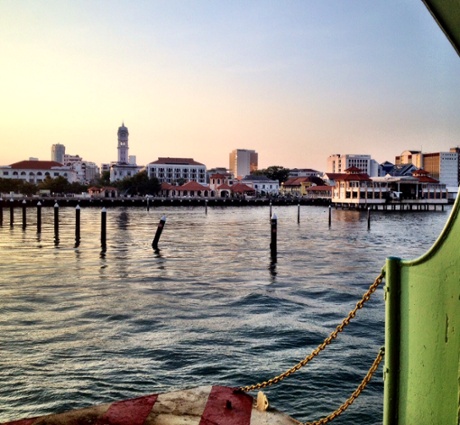
Jackie Snow, The Guardian, November 30, 2015
After sending out invitations for a 300-guest wedding, the last thing Owen Gaddis wanted to do was organize a honeymoon. Gaddis works for a travel agency so planning one would have been like a day at the office.
Luckily, after a couple of glasses of wine at dinner, Ansley Thomas, a friend from high school and fellow travel agent, offered to plan his honeymoon for him. Thomas added one condition: the couple wouldn’t find out until the wedding where they were going.
Gaddis, also a couple of glasses of wine in, agreed. He gave her a few guidelines – how long they wanted the trip to be, and the budget they had in mind – along with one request: they wanted to end on a beach.
After eight months of keeping it all a secret, Thomas announced where Gaddis and his new wife, Chelsey, were headed at their rehearsal dinner.
“It was a total surprise,” he says. “And it was cool that our friends and family got to live that excitement too.”

The view of George Town from the ferry, which you have to take from Butterworth on the mainland. Photograph: Serena Ryder
That’s how the newlyweds found themselves two days later flying to Istanbul, followed by a trip to Tanzania to the Rift Valley to see the wildebeest migration, before heading to Dubai and ending at a beach resort in Oman.
These honeymoons planned without the newlyweds’ knowledge, or “mysterymoons” as they are sometimes called, are a new trend in travel. Simultaneously planning both a wedding and honeymoon can be an overwhelming task, and some couples see mysterymoons as a way to bring adventure to their honeymoons with no work on their part.
Serena Renner and Kevin Schnepel got married in March in Sydney, Australia, where they live. Although the ceremony was small and comparatively easy to organize, they turned to Trish White, a friend and travel agent, to plan their honeymoon. She checked their budget and time length and came up with a destination. Renner and Schnepel got to the airport and opened the envelope White gave them to find tickets to Singapore.
White had only planned the flight and accommodations for the first day, so the couple was on their own to plan the rest of the trip. After Singapore, they ended up in Malacca and George Town in Malaysia, Bantam, Indonesia and then to a private island.
Renner, who is a journalist that does a lot of travel writing, felt a sense of freedom from not doing the due diligence she normally does on trips.
“It felt like traveling,” Renner says. “We didn’t want any expectations, and we didn’t want me to be able to work.”
But all was not perfect. Renner says she realized she likes having plans ahead of time. White had also booked them in a room with no window and a bunk bed.
“It was a funny first night of a honeymoon,” Renner says.

A sign that says ‘one way’ in Malay in George Town across the street from one of the hotels Renner and Schnepel stayed in. Photograph: Serena Renner
Gaddis himself has helped plan plenty of partial mysterymoons, where one partner is surprised.
Tess Newman-Morris’s husband, Jack Morris, planned their honeymoon and surprised her. He had done the same on previous vacations, so she trusted him with their honeymoon. Even their wedding this March, on Satellite Island off Tasmania, was a spot that Morris had taken her to on a mystery trip and that they loved so much they got married there. Their honeymoon was a 10-day trip through Sri Lanka and the Maldives.
“Instead of carefully planning each and every step together, trawling through websites and hotel rooms, surprise holidays are like being taken on an adventure.” Newman-Morris says. “I think it’s also fun for the planner, but it’s definitely my turn to arrange a trip and surprise Jack for once.”
Gaddis and Thomas both think there could be a successful model for more people to go on and enjoy mysterymoons. It would take close collaboration with a travel agent or friend who knows the couple well and is willing to do their homework. Thomas, for instance, took notes on where they had already gone, got the couple’s medical records and spoke to both sets of parents. Thomas even called their doctor and organized their vaccine shots to be kept secret from them.
The biggest hurdle, both Thomas and Gaddis say, is letting go.
“People want it to be perfect and relinquishing that control can be hard,” Gaddis says. “Hopefully it’s a once-in-a-lifetime deal.”
This article originally appeared on guardian.co.uk
This article was written by Jackie Snow from The Guardian and was legally licensed through the NewsCred publisher network.
![]()